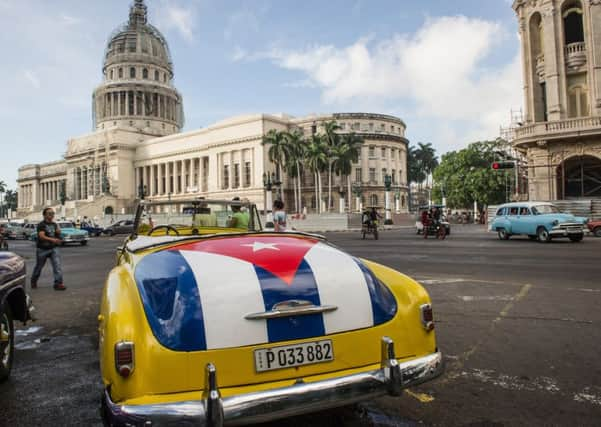Cuba and US restore diplomatic relations


The new era began with little fanfare when an agreement between the two nations to resume normal ties came into force just after midnight on Sunday and the diplomatic missions of each were upgraded from interests sections to embassies.
When clocks struck 12am in Washington and Havana, they tolled the death knell for policy approaches spawned and hardened over the five decades since President John F Kennedy first tangled with youthful revolutionary Fidel Castro over Soviet expansion in the Americas.
Advertisement
Hide AdAdvertisement
Hide AdWithout ceremony in the pre-dawn hours, maintenance staff hung the Cuban flag in the lobby of the State Department alongside those of other nations with which the US has diplomatic relations. The historic shift was publicly memorialised later in the day when Cuban officials formally inaugurated their embassy in Washington and Cuba’s blue, red and white-starred flag will fly for the first time since the countries severed ties in 1961.
US Secretary of State John Kerry met Cuban counterpart, Bruno Rodriguez, and addressed reporters at a joint news conference. The US Interests Section in Havana announced its upgrade to embassy status in a written statement yesterday, but the Stars and Stripes will not fly at the mission until Mr Kerry visits in August for a ceremonial flag-raising.
And yet, though normalisation has taken centre stage in the US-Cuba relationship, there remains a deep ideological gulf between the nations and many issues still to resolve. Among them, thorny disputes such as over mutual claims for economic reparations, Havana’s insistence on the end of the 53-year-old trade embargo and US calls for Cuba to improve on human rights and democracy. Some US politicians, including Republican presidential candidates, have vowed not to repeal the embargo and pledged to roll back President Barack Obama’s moves on Cuba.
Nonetheless, yesterday’s events cap a remarkable change of course in US policy toward the communist island under Mr Obama, who had sought rapprochement since he first took office and has progressively loosened restrictions on travel and remittances to Cuba.
His efforts at engagement were frustrated by Cuba’s imprisonment of US Agency for International Development contractor Alan Gross on espionage charges. But months of secret negotiations led in December to his release, along with a number of political prisoners in Cuba and the remaining members of a Cuban spy ring jailed in the United States. On 17 December, Mr Obama and Cuban president Raul Castro announced full diplomatic relations would resume.